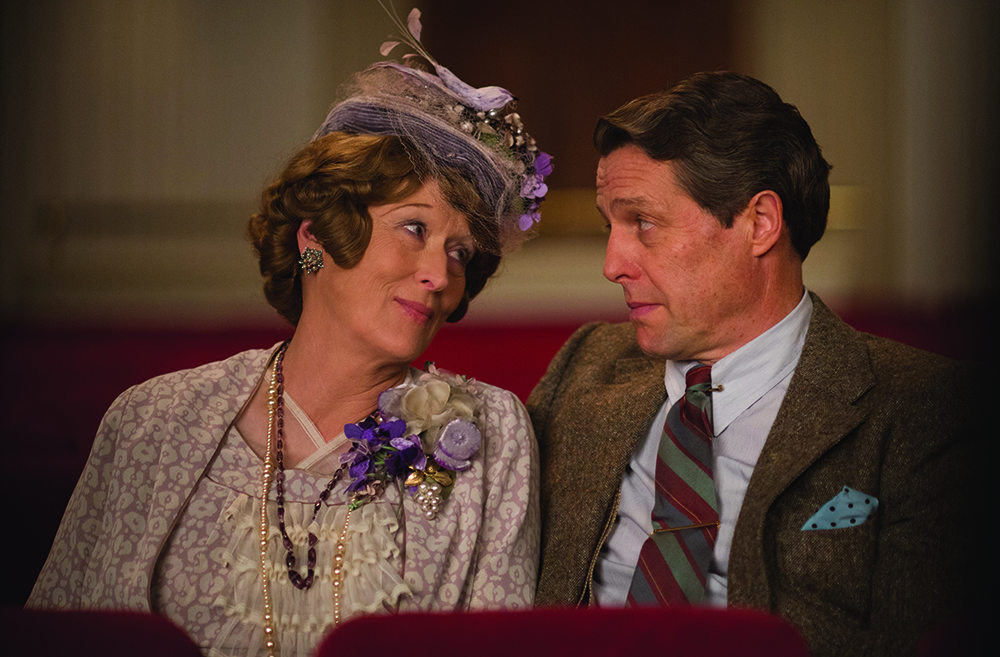For a woman who died over seventy years ago, Florence Foster Jenkins is currently enjoying an unexpected surge in popularity. Not even two months ago, Xavier Giannoli’s Marguerite was released, a film that recasts Foster Jenkins’s story among the anarchic ructions of 1920s France. Stephen Frears’s bluntly-titled Florence Foster Jenkins is a straighter telling of the story, set in the glitzy, gaudy New York of the early 1940s. Quite why the peculiar life of possibly the worst opera singer in history is suddenly a rich source for cinema is anyone’s guess, particularly when both adaptations come from outside the tale’s native USA.
Florence is a moneyed heiress whose one passion in life is her music, which she channels into being the hostess of a supper-club variety show with her husband St. Clair Bayfield (Hugh Grant), a failed actor who has resigned his life to supporting Florence’s artistic whims. Florence enters the film from the heavens, lowered awkwardly from the rafters adorned with angel’s wings and a billowing dress, and it is only by the most strained efforts that she doesn’t crash onto the stage. She’s cushioned everywhere, with society indulging her screeched operettas with deceptive rhapsody in exchange for the funds she donates. Florence lives in a bubble of success, and the comedy inherent in the story is the gulf between reality and her perception of her talents. Eschewing the temptation to mock and pity Florence is something Giannoli managed impressively with his French proxy; Frears, sad to say, does not pull off such a feat.
Frears does his lead actress a disservice by focusing so intently on Florence’s illness and frailty, lingering on the bedtime ritual where St. Clair removes her wig to reveal the shaved head she has as a result of contracting syphilis from her first husband. Streep commits herself with great gusto to the part, understanding Florence’s devotion to her great passion, but Frears robs her of the opportunity to layer the character with much else. Nicholas Martin’s screenplay doesn’t seem to believe that the audience will be able to identify with Florence, and so continually places the male figures of Bayfield or accompanying pianist Cosmé McMoon (The Big Bang Theory’s Simon Helberg) as the audience surrogates into this wild world.

New York is imagined in colours and fakery similar to Woody Allen’s loving recreations, but doesn’t use this with any of the same charm; the camera prefers empty close-ups, the backgrounds merely a blur. The avenues for a rich, joyous experience are all presented, yet the film takes the wrong turning at every junction. Florence is either the butt of the joke or the burden around a neck, never a character whose desires are treated with respect. Bayfield has his ‘proper’ life with his younger girlfriend Kathleen Weatherley (Rebecca Ferguson), whose resentment of the other woman handily only blossoms part way into the film, to emphasise what Bayfield is giving up to tend to Florence’s foolish whims. A newspaper reviewer, Earl Wilson (Christian McKay), cruelly commits himself to exposing Florence’s crimes against music, and a better script would explore how Florence’s societal stature and cultural rebellion is something revolutionary. Here, the pity simply balloons.
In one amusing running joke, Florence is particularly anxious that her soirées are well-stocked with potato salad, to the extent that we see a maid spooning it out of a bathtub. Florence Foster Jenkins is not nearly so packed; there are no brains inside it, because the filmmakers don’t seem to think that Florence has many. It may satisfy audiences looking for a light snack, but there’s little worth consuming in Frears’ derisive portrait of a truly individual woman, who is here given the due history served her in the first place, and nothing more.
Florence Foster Jenkins is in cinemas from Friday 6 May.




